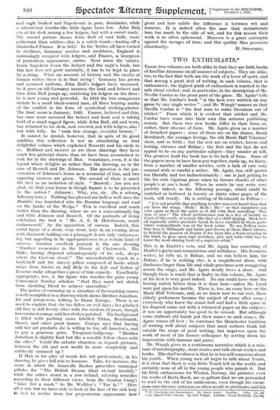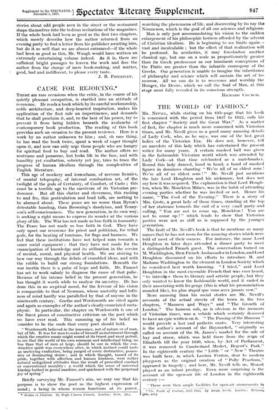TWO ENTHUSIASTS.*
THESE two volumes are both alike in that they are both books of familiar discourse on all manner of subjects. They are alike,
too, in the fact that both are the work of a lover of sport, and that among a great- deal of writing, in each volume, that is enthusiastic, the highest pitch of enthusiasm is reached in the talk about cricket, and, in particular, in the description of Mr. Neville Cardus as the prose poet of the game. Mr. Agate' tells us that Mr. Cardus's book " is the best ever written on any game by any single writer" ; and.Mr. Waugh' assures us that Neville Cardus is " the first man to make literature out of cricket." From which it is evident that cricket and Mr. Cardus have come into their own this autumn publishing season. But these two new books differ in their form, or, rather, their absence of form. Mr. Agate gives us a number of detached papers ; some of them are on the drama, Sarah Bernhardt, the younger Irvings, the old Music Hall Veterans'- show, and so forth ; but the rest are on cricket, horses and boxing, circuses and Balzac ; the first and the last do not appear to be on any particular subject—they wander at will. The greatest fault the book has is its lack of form. Some of the papers seem to have been put together, made up, we fancy, from a number of smaller articles, with a lack of care very unusual with so careful a writer. Mr. Agate, too, still quotes too liberally and too indiscriminately ; one is just getting to like his own vigorous prose when he throws chunks of other people's at one's head. When he wants he can write very prettily indeed, as the following passage, which could be matched or bettered in twenty or thirty other pages of the book, will testify. He is writing of Bernhardt as Pelleas :-
" It is not possible that anything lovelier was ever heard than that cry from the wings, ' Holt ! Holt ! Ho ! ' or that happiness can ever again so flood the spirit as it did with that onrushing Moi, moi, et moi ! ' The whole performance was in a key of beauty as if not of this earth, of ecstasy like that of a child singing. Mark how all reputable critics proclaim Sarah to have excelled in those parts where verisimilitude was of the least value. To see Pelleas raise that face to M6lisande and bathe and drown in those black tresses, to behold the passion of Jeanne d'Arc burn like a flame swaying in the wind, to gaze upon rapt inviolacy, pity and ruth—this was to know the most shining facet of a supreme artist."
This is in Hazlitt's vein, and Mr. Agatg has something of Hazlitt's gusto and romanticism and wilfulness. His favourite
writer, he tells us, is Balzac, and we can believe him, for Balzac, if he is nothing else, is a magnificent show, with duchesses larger than life and whole provinces sent swaggering across the stage, and Mr. Agate dearly loves a show. And though there is much that is faulty in this volume, Mr. Agate at his best is very good indeed. No one could have done the boxing match better than it is done here—unless Mr. Lynd were put upon his mettle. There is, too, an essay here on the; Music Hall Veterans, and, as we know now to our cost, these elderly performers became the subject of essay after essay everybody who knew the music hall and had a little space at his disposal came out with a whimsical paper on the subject ; it was an opportunity too good to be missed. But although some stalwart old hands put their names to such essays, Mr Agate comes off best ; he continues the Manchester tradition of writing well about subjects that most authors think fall outside the scope of good writing, but improves upon the work of most of his former colleagues by setting down his impressions with humour and gusto.
Mr. Waugh gives us a continuous narrative which is a mix- ture of autobiography, short stories and talk about cricket and books. His chief weakness is that he is too self-conscious about his youth. When young men all begin to talk about Youth, it is clear that there is very little Youth left in the world, and certainly none at all in the young people who parade it. But his little enthusiasms for Wisden, Norway, the pictures, even the works of Berta Ruck, are so gallant that we are persuaded to read to the end of his confessions, even though his excur- sions into literary criticism so often result in platitudes and his
• (1) Fantagas and Impromptus. By JamesAgate. Lon-don : ollinA. l7a. °di —(2) Myself When Young. By Alec Waugh. London : Grant Diehards. 17a, 6,1;
stories about odd people seen in the street or the restaurant shape themselves into the tedious recitations of the magazines. If the whole book had been as good as the first two chapters, which merely describe how the author returned from an evening party to find a letter from his publisher awaiting him, but do it so well that we are almost entranced—if the whole had been as good as this, Mr. Waugh would have written an extremely entertaining volume indeed. As it is, there are sufficient bright passages to leaven the work and free the author from the charge of mere book-making, and matter, good, bad and indifferent, to please every taste.
J. B. PRIESTLEY.



























































 Previous page
Previous page